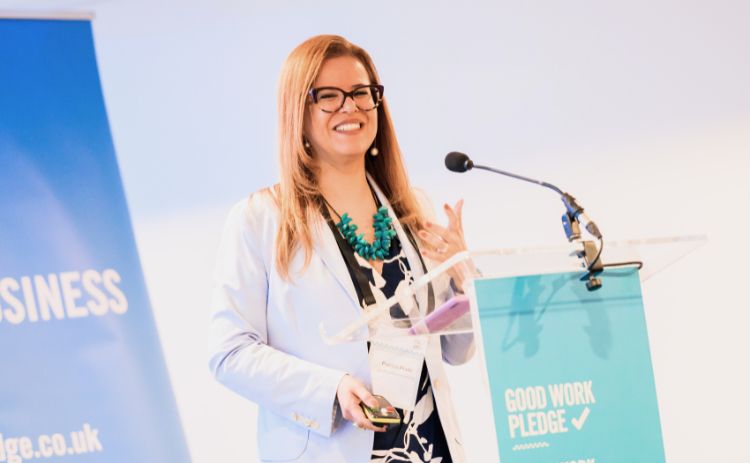Q&A with Dr Patricia Prado: Tackling Food Waste Through Residents Engagement and Policy Change
Learn about Dr Prado’s sustainability research and her recent project within the region.
25 September 2025
To mark the UN’s International Day of Awareness of Food Loss and Waste on Monday 29 September, we spoke with Dr Patricia Prado, Lecturer in Sustainable and Responsible Business at Newcastle University Business School, about her recent collaboration with Insights North East (INE) and Newcastle City Council.
Dr Prado is leading the second phase of this collaborative project involving a research team from Newcastle, Northumbria and Sunderland Universities, aimed at understanding and improving resident participation in food waste recycling schemes.
With mandatory household food waste collection in England set to begin in March 2026 under the Environment Act 2021, her work is helping shape how local authorities engage communities in sustainable behaviour change.

Q&A with Dr Prado
What inspired your involvement in food waste research at the local level?
Household food waste remains the largest contributor to all food wasted in the UK, corresponding to an estimated 6 million tonnes in 2022 alone, which is 73% of the total food wasted. With the new legislation, local authorities face urgent challenges in ensuring public participation. However, current interventions often treat food waste as an isolated behavioural issue, and I was particularly interested in how these interventions can be to increase participation. Working with Newcastle City Council and Insights North East gave me a unique opportunity to explore this from both a research and practical perspective.
Can you tell us more about the project and why it is important now?
This is a timely initiative – Newcastle City Council has been proactive, launching a pilot scheme across the city and partnering with researchers to evaluate its effectiveness. The project focuses on understanding how residents perceive food waste, what motivates or hinders their participation in recycling schemes, and how communication strategies can be tailored to different communities. Our goal is to generate actionable insights that can inform policy and practice in a way that’s inclusive, effective, and grounded in real-world experiences.
You’re leading Phase 2 of the project. What does this involve?
Phase 2 is qualitative and builds on the survey and geolocation data analysis from Phase 1. I’ve led a series of four community workshops with residents both inside and outside the pilot areas. These sessions were designed to explore lived experiences, perceived barriers, and co-create solutions. We’re currently finalising the analysis and preparing a report for Newcastle City Council, with dissemination planned for October.
Food waste may seem like a small issue, but it is a powerful entry point for broader sustainability action.
What are some early insights emerging from your research?
While the findings are still in the preliminary phase and not yet approved for publication, I can say that the barriers were diverse and often interconnected. They ranged from practical issues like bin design and household capacity, to behavioural and motivational factors. But residents proposed a range of thoughtful and creative solutions and what stood out was their willingness to contribute ideas and their desire to see tangible improvements. I can also highlight a couple of themes that have surfaced:
Household and Social Dynamics: Food waste behaviours are often shaped by household routines, family roles, and cultural norms. These dynamics can influence how people engage with waste collection services.
Perceived Financial Benefits: Some residents associate food waste reduction with saving money – a potentially powerful motivator that could be better leveraged in public messaging.
These are just a few “spoilers” – we’re still analysing the data, but they point to the importance of designing interventions that are not just technically sound, but socially aligned.
Why is the upcoming policy change so significant?
The mandatory food waste collection policy marks a major shift in how local authorities and households manage organic waste. It’s not just about compliance – it’s about creating a more sustainable food system. By diverting food waste from landfill, we reduce greenhouse gas emissions and open up opportunities for composting and energy recovery. But for the policy to succeed, resident engagement is key. That’s where research like ours can help – our findings offer practical recommendations, with insights from Phase 2 especially valuable because they reflect real community voices and can guide targeted interventions.
What’s next for your work in this area?
We’re continuing to work closely with Newcastle City Council to refine our findings and support their implementation strategy, while working with INE to ensure the findings are shared with wider stakeholders. I’m also interested in exploring how these insights can be adapted to other cities and regions. There’s a real opportunity here to connect academic research with policy innovation – and to make a tangible impact on sustainability at the local level.
Final thoughts?
I’m proud to be part of a project that brings together research, policy, and community voices. As we approach the mandatory rollout, it’s vital that we listen to residents and co-design solutions that work for everyone. Food waste may seem like a small issue, but it is a powerful entry point for broader sustainability action.
